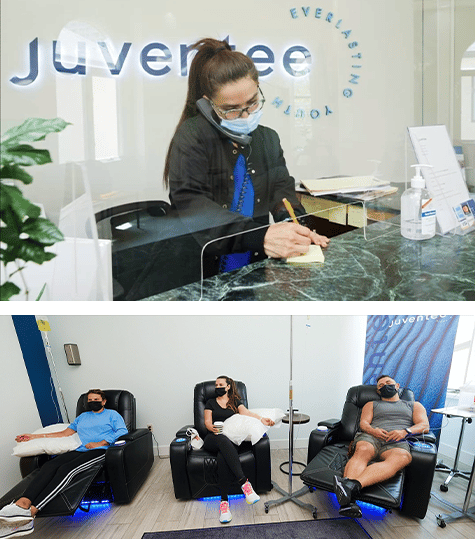Reclaim Your Youth and Vitality with TRT in Tenafly, NJ
It can be hard to hear for some, but getting older is just part of life. For many men, hitting a certain age signifies the beginning of a new chapter - where bucket list items are crossed off, and goals are accomplished. For others, however, aging is a scary prospect, filled with nagging injuries, embarrassing weight gain, and inability to perform intimately. Few things feel worse than realizing that you simply can't perform as you used to, whether on the basketball court or in the bedroom.
The reality is, as men get older and approach middle age, their testosterone levels drop. When a male's testosterone levels get lower, it can cause a slew of unwanted symptoms like:
If you have noticed any of the above symptoms and feel like you're just dragging yourself through life, don't lose hope. Many men around the country are experiencing the same feelings as you. Thankfully, you don't have to settle for the side effects of low testosterone. There are proven, easy steps that you can take to reverse the negative signs of aging. If you're ready to reclaim your youth and feel like you did in your 20s and 30s, testosterone replacement therapy (TRT) may be the perfect solution.
TRT bridges the gap between your old life and the happier, more vibrant version of you. That's where Juventee comes in - to facilitate your transition to a more youthful, fulfilling life and a brighter future. After all, aren't YOU supposed to be in charge of your wellness and health? With the Juventee team by your side, you'll have the tools to do so - backed by a personalized plan crafted by experts with more than 20 years of experience.
The Juventee Difference
At Juventee, we propose a preventive and proactive medical approach to preserve optimal body function, with the best hormonal functioning to prolong vitality and youthfulness. Our specialty is Age Management, which is based on the belief that balance is the key to wellness. We employ the most innovative science, offering treatments like TRT in Tenafly, NJ, and other clinical products with proven efficacy.
Living a younger, healthier, and longer life is a frequent commitment for Juventee's team of specialists. We are experts at designing customized programs that work synergistically with your body and brain. We love incorporating smart nutrition, hormonal balance, exercise, stress management, cognitive health, and lifestyle changes into our treatment programs. We also implement sciences such as testosterone replacement therapy to achieve verifiable, legitimate results.
Our doctors take differing approaches to care but share the single goal of prolonging your youth and vitality. With that goal in mind, Juventee was born from the hands of its partners, who want you to feel full strength, energy, joy, confidence, and wellbeing.
testosterone levels. Unfortunately, when a man loses too much testosterone, it results in a condition called hypogonadism. Also called "Low T," testosterone loss due to hypogonadism must be replenished, or the male suffers from difficult, even debilitating symptoms.
We Work With


What is Testosterone?
What pops up in your head when you think about testosterone? Many people associate testosterone with being overly aggressive, macho, and violent. However, the truth is that testosterone is a critical hormone for men and affects the male lifespan from puberty through old age. As a sex hormone, male testosterone is produced through the testicles. It becomes most prevalent during puberty.
Testosterone production is controlled by the pituitary gland at the base of a man's brain. This gland sends signals to the testes, which in turn produce testosterone. A feedback loop helps regulate the amount of testosterone in the blood. When levels are too high, the brain orders the pituitary gland to restrict production.
Did You Know?
Cholesterol synthesizes the testosterone in your body. However, having high cholesterol doesn't mean you have high testosterone levels, too. T levels are too carefully controlled by your pituitary gland for cholesterol to raise testosterone levels.
During puberty, testosterone helps males develop:
- Body Hair
- Facial Hair
- Muscle Strength
- Increased Libido
- Deeper Voice
- Muscle Density
- Sperm
What is TRT in Tenafly, NJ?
Testosterone replacement is exactly what its name implies. It's a therapy for men that replaces diminished testosterone levels, which helps balance your hormones and ultimately improves your life. Also called androgen replacement therapy, TRT alleviates many of the side effects that men suffer from as a result of low testosterone.
Testosterone was originally synthesized in a lab in 1935. Its popularity has grown since, and today, it is among the most promising doctor-prescribed treatments for men in the United States.
So, how does testosterone replacement therapy work? TRT essentially gives you the testosterone needed to be healthy and have a properly functioning body. As the primary androgen for males, testosterone has a role in the natural processes your body needs for overall health. This extra hormonal intake positively affects patients and their general health, preventing diseases such as osteoporosis, cardiac diseases, and more.
Though there is an abundance of testosterone in your system throughout puberty and into your 20s, it gradually depletes with age. Sometimes, serious injuries and long-term conditions like diabetes affect testosterone levels. Unfortunately, when a man loses too much testosterone, it results in a condition called hypogonadism. Also called "Low T," testosterone loss due to hypogonadism must be replenished, or the male suffers from difficult, even debilitating symptoms.

Common Signs of Low Testosterone
Though some symptoms of low T are abundantly evident, not all men can immediately tell they may need TRT. If you're unsure, ask yourself these questions:
- Are you usually a productive powerhouse but now feel like you lack drive and motivation?
- Have you had a normal sex life in the past but now find that you're losing the ability to be intimate?
- Are you usually calm and collected, but your partner is complaining about your irritability?
If you answered yes to any of those questions, it could be time to contact Juventee about a personalized TRT plan. Still unsure if you're experiencing symptoms of low T? We have compiled a more extensive list of signs below:

Decreased Energy
Low energy used to be considered a normal part of aging. Today, most doctors know better. Modern advances in medicine show that lack of energy and low T often go hand-in-hand.
If it's a huge struggle to keep up with your kids on the soccer field, or you just don't have the energy to be active, you may have low testosterone. Getting tired is normal, but if it's an ongoing problem affecting you and your family, it's time to consult a doctor.
Whether you're having a tough time getting through your day or can't finish normal activities, TRT in Tenafly, NJ could be the solution.

Lowered Libido
You would think that lowered libido would be easy to pick up on, but when it happens gradually, it can be more difficult to diagnose. With that said, many men use TRT because they've lost that "spark" in the bedroom. It's not easy for a man to hear that they're not pleasing their partner because intimacy is an important part of a relationship.
The good news? Having a low libido doesn't have to be permanent. TRT treatments can help revert hormone levels to their normal range, making for a more enjoyable sex life.

Hair Loss
If you're like millions of other men, hair loss is an unfortunate reality you don't want to think about. Closely related to hormone imbalances and testosterone decline, hair loss is about as distressing as it gets. This common symptom is often related to DHT - a derivative of testosterone that can cause hair follicles to die.
Thankfully, a carefully monitored TRT regimen can help restore hair, especially when combined with methods like plasma-rich therapy. While it's true that you can't change your genes, you can change the effects of low testosterone in your body, so hair loss isn't your only reality.

Inability to Achieve and Maintain Erections
Weak erections - it's an uncomfortable subject for men to talk about. It's even worse to experience the symptom in the heat of the moment. Despite being very common, men shame themselves when they can't achieve an erection. And while there are many reasons for this malady, low testosterone is often a contributing factor.
Fortunately, you don't have to live with weak erections forever when you balance your hormones with a personalized TRT treatment plan from Juventee.

Depression
You're feeling down about everything and can't figure out why you feel crummy about life. You're successful at work but feel unaccomplished. If you're experiencing symptoms like these, you may be depressed - and it could be stemming from low testosterone.
Studies show that men with depression and high cortisol levels also commonly have low testosterone. Because higher cortisol levels can lead to low T, the chances of severe depression increase.
Depression is a very real disorder and should always be diagnosed and treated by your doctor. One treatment option, when used in conjunction with therapy, is TRT. When TRT is used to replenish hormone levels, men enjoy a lighter, more optimistic mood. That's great news for depressed men who have had little-to-no success with powerful anti-depression meds.

Lack of Sleep
Experts have found that men who lose a week's worth of sleep may experience a drop in testosterone by as much as 15%. These findings are alarming and may suggest that sleep loss lowers T levels and affects wellbeing.
If you find yourself exhausted at the end of the day but toss and turn all night long, it could be time to have your testosterone levels checked. TRT may restore your testosterone levels which can help you sleep better with proper exercise and diet.

Loss of Strength and Muscle Mass
Are you struggling to lift weights in the gym or find that you can't pick up items that used to be easy to lift? Studies show that inactive men can lose .5% of muscle strength each year after the age of 25. When you hit 60, muscle loss doubles every ten years. While muscle loss is common with age, it can also be linked to low T.
Testosterone is a crucial piece needed for building and retaining muscle mass. That's why many doctors are prescribing TRT for males experiencing sharp declines in strength and muscle mass. Whether your workouts are losing steam or you're having problems lifting items that aren't very heavy, don't blame it all on age. You could be suffering from hypogonadism.

Weight Gain
Nobody likes to gain weight, even though our society is more accepting of overweight people than ever before. Despite diets and carb cutting, many men aren't able to get rid of excess belly and body fat, increasing the chances of heart disease and cancer.
Sometimes, male weight gain isn't caused by sweets and carbs but by hormone imbalances that slow the metabolism. This phase of life is called andropause and occurs when testosterone levels are low. Combining a low metabolism with other symptoms like high cortisol levels can be a recipe for a double-chinned disaster. Fortunately, TRT treatments and physician-led weight loss programs can correct hormone imbalances and lead to healthy weight loss for men.

Gynecomastia
The enlargement of male breast tissue, also called "man boobs," is a fairly common condition that many men have. Though it is closely associated with diet and other life choices, increased fatty tissue is often caused by hormonal imbalances.
If you're approaching middle age and you're embarrassed by having large breasts, don't lose hope. TRT is a safe, effective way to eliminate the underlying cause of gynecomastia without invasive surgery. With a custom HRT and fitness program, you can bring your testosterone and estrogen levels back to normal before you know it.

Be the Best Version of Yourself with TRT in Tenafly, NJ
The human body is amazing in so many ways. Still, we have to optimize it every now and then using science, medicine, and hard work. After 40, you may notice that your body is changing, but symptoms like low libido and lack of motivation don't have to be permanent. Juventee has the team, tools, and experience to help recapture your youth and feel better than ever before.
If you're getting older and you're worried about low testosterone, give our office a call today. It would be our pleasure to care for you using the highest quality products, backed by research and applied by professionals with your best interests in mind.
Whether you need a boost to help you get through your busy work week or a natural solution to an embarrassing problem like ED, we're here for you. Our doctors will explain your treatment options in-depth and take as much time as you need to feel comfortable and confident about TRT. Remember, when you treat your body with love and care, it will reciprocate generously. Let our team teach you the techniques to prolong your sense of youth and provide you with the treatment to solidify your wellbeing as you age with grace. Contact Juventee today. By tomorrow, you'll be one step closer to meeting the best version of yourself.

Latest News in Tenafly, NJ
Unoccupied Shabbat table represents hostages in Israel during New Jersey rally
Crystal Cranmorehttps://abc7ny.com/new-jersey-rally-israel-nj-tenafly/13982355/
TENAFLY, New Jersey (WABC) -- There were prayers on Friday for the safe return home of those kidnapped by Hamas. A powerful symbol - an unoccupied table, represented the hostages who are not able to celebrate the Jewish Sabbath with their families."It's really hard, we are broken," said Adi Levy.229 empty seats lined the table for a feast in Tenafly. Among the vacant seats - high chairs - a representation of children who were taken captive by Hamas.One of the hostages is Edan Alexander, 19, who is a graduate of...
TENAFLY, New Jersey (WABC) -- There were prayers on Friday for the safe return home of those kidnapped by Hamas. A powerful symbol - an unoccupied table, represented the hostages who are not able to celebrate the Jewish Sabbath with their families.
"It's really hard, we are broken," said Adi Levy.
229 empty seats lined the table for a feast in Tenafly. Among the vacant seats - high chairs - a representation of children who were taken captive by Hamas.
One of the hostages is Edan Alexander, 19, who is a graduate of Tenafly High School and the son of Israeli parents. He was serving In the Israeli Army near Gaza when the attack happened on October 7.
The families of the missing were surrounded by love and light as hundreds ushered in Shabbat, praying for the hostages' safe return. The Jewish day of rest is celebrated each week from sundown Friday to sundown on Saturday.
"Trying to raise awareness...this isn't over," said organizer Daphna Arad.
U.S. officials have urged Israel to delay a ground invasion to give time for hostage negotiations.
Meanwhile, Israeli leaders said it sent tanks into the Gaza Strip on Thursday night in preparation for the next stages of combat.
"Whatever it takes to destroy the terrorist organization is legit and is right," said community member Orly Chen.
Eshley Omer is a veteran of the Israel Defense Forces.
"If I was here by myself - without kids, I would've been there already," said Omer.
For now, Omer says he is spreading awareness is the least he can do - to help reunite the kidnapped with their families.
"I think of my kids and how lucky I am," says Omer.
ALSO READ | Husband of Cardi B's nail artist charged with setting fire to Bronx salon
----------
* Get Eyewitness News Delivered
* Download the abc7NY app for breaking news alerts
Submit a tip or story idea to Eyewitness News
Have a breaking news tip or an idea for a story we should cover? Send it to Eyewitness News using the form below. If attaching a video or photo, terms of use apply.
Hamas releases some hostages, but others like Edan Alexander of Tenafly, remain captive
Deena Yellinhttps://www.northjersey.com/story/news/2023/11/24/edan-alexander-tenafly-nj-captive-hamas-releases-hostages/71683425007/
2-minute readAlthough some families will soon be reunited with their loved ones who have been held hostage by Hamas in Gaza for more than 48 days, others continue to face an excruciating wait.Many families have not heard from their relatives since Oct. 7 when they were kidnapped. The Red Cross has not visited them ...
2-minute read
Although some families will soon be reunited with their loved ones who have been held hostage by Hamas in Gaza for more than 48 days, others continue to face an excruciating wait.
Many families have not heard from their relatives since Oct. 7 when they were kidnapped. The Red Cross has not visited them and there's been no news of their condition. Some have seen photos of them on social media as they were dragged and taken hostage.
"We have heard nothing," said Amir Hoshen Friday morning.
Hoshen's nephew, Rom Broslavski, was captured at the Nova music festival in southern Israel on Oct. 7. He was working as a security guard and reportedly helped several of the teens escape to safety. In his last phone call with his mother, he told her he loved her and attempted to reassure her that he was safe.
"He's a leader, always volunteering, always trying to help people," Hoshen told NorthJersey.com and The Record last week.
Under the terms of a four-day Israel-Hamas truce, 50 women and children hostages are to be released over the four-day period in return for 150 Palestinian prisoners held in Israeli jails.
Hamas released the first group of hostages on Friday, including Israeli women and children and Thai farm workers, according to the Red Cross.
The hostages included 13 Israelis, according to Israeli media. Thailand also said 12 Thai nationals who had been taken hostage were released Friday. U.S. officials don't expect any Americans to be among the hostages released Friday.
As many as 39 Palestinian prisoners, expected to be women and children, could also be returned to the West Bank and Gaza on Friday.
Edan Alexander of Tenafly remains hostage
Edan Alexander of Tenafly, 19, is a graduate of Tenafly High School who has been described as "fun loving" and a "devoted friend" who enjoys parties, concerts and extreme sports.
He volunteered to serve in the Israel army last year following his high school graduation and was guarding the Gaza border when he was kidnapped on Oct. 7 by Hamas attackers who stormed into Israel, killed some 1,200 people and wounded scores more.
His mother, Yael, said she last spoke to him on the morning of Oct. 7, and he reassured her that he would be okay despite the attack that day. She said she knew something was wrong when he didn't return her calls later that day.
After a week, Israeli officials informed her that Edan had been kidnapped by Hamas. They have repeatedly asked about his whereabouts and well being but there's been no news.
"We have heard nothing. We are praying that all of the hostages will return home," she said at a forum at the Kaplen JCC in Tenafly in early November.
She declined to speak to NorthJersey.com but recently posted on Facebook, "Praying that you will come back us forever healthy and whole! I love you with all my heart."
Tenafly councilman, son released after hearing on child porn charges. Here's what happened
Kaitlyn Kanzlerhttps://www.northjersey.com/story/news/bergen/tenafly/2023/10/18/tenafly-nj-council-president-son-released-court-child-porn-charges/71223416007/
A Tenafly councilman facing calls for his resignation and his son, both accused of possessing a large amount of child pornography will be released from jail, despite the harrowing images described during their detention hearing.The pair appeared in state Superior Court in Hackensack separately on Wednesday f...
A Tenafly councilman facing calls for his resignation and his son, both accused of possessing a large amount of child pornography will be released from jail, despite the harrowing images described during their detention hearing.
The pair appeared in state Superior Court in Hackensack separately on Wednesday for a detention hearing before Judge David Labib.
Jeffrey, 65, and Steven Grossman, 24, will be confined to their home rather than held in jail while they await trial. The Grossmans were charged with second-degree possession of child pornography by the Bergen County Prosecutor's Office after a search of their Tenafly home.
Jeffrey Grossman is a teacher in Rochelle Park and is the Tenafly Borough Council president, and Steven Grossman is a social worker and substitute teacher for the same K-8 district. They were both suspended and are prohibited from contacting staff or students or going on the Rochelle Avenue property, said Sue DeNobile, the Rochelle Park school superintendent.
During the hearing, Assistant Prosecutor Gary Donatello argued that the men should remain incarcerated due to the charges, the length of time they could spend in jail if convicted and the fact that their home is less than 500 feet from an elementary school.
Jeffrey and Steven Grossman's attorneys, Samuel Braverman and Chris DiLorenzo, respectively, argued that the men are not flight risks and there are no indications they would try to intimidate anyone or miss their court dates.
Local:Tenafly High School teacher accuses district of misrepresenting attendance numbers
Labib disagreed with Donatello, finding that the state did not overcome its burden for detention. He ordered the men to be under strict home detention with no electronic monitoring.
They are required to report to pretrial monitoring every week by phone and in person, must appear for all court proceedings, must notify the court of any address or contact information changes, cannot commit any new offenses, cannot own a weapon, must refrain from excessive use of alcohol or drugs, may not leave home except to go to court, must surrender their passports, cannot have any unsupervised contact with any minors and cannot have internet access on any device.
After the state requested it, Labib restricted the Grossmans' access to their front yard and backyard from 8 to 9:30 a.m. and 2 to 3:30 p.m., times when students arrive and are dismissed from school.
During the hearing, Donatello described what some of the images and videos found on the Grossmans' electronic devices depicted.
Over 1,000 depictions of child sexual abuse of boys generally between 10 and 13 were found in a Dropbox used by Steven Grossman, and over 17,500 depictions of younger prepubescent girls were found on Jeffrey Grossman's devices, Donatello said.
The next court date for both men is Nov. 30.
After the charges were announced, Mayor Mark Zinna said he was shocked to learn of the accusations and that it would be in the borough's best interest for Grossman to resign.
Tenafly High School hires football coach with extensive NFL experience
Darren Cooperhttps://www.northjersey.com/story/sports/high-school/football/2023/04/25/tenafly-nj-football-alonos-escalante-named-head-coach/70146134007/
Alonso Escalante went from coaching football in high school to the NFL and back again.The 35-year old Glen Rock native was approved as new head coach at Tenafly by the Board of Education on Monday night. He takes over one of North Jersey’s oldest and proudest programs, but one that hasn’t reached the playoffs since 2009.“We will turn into a winning program by taking it one day at a time,” Escalante said. “It’s all about building a community and a culture. I have to start there....
Alonso Escalante went from coaching football in high school to the NFL and back again.
The 35-year old Glen Rock native was approved as new head coach at Tenafly by the Board of Education on Monday night. He takes over one of North Jersey’s oldest and proudest programs, but one that hasn’t reached the playoffs since 2009.
“We will turn into a winning program by taking it one day at a time,” Escalante said. “It’s all about building a community and a culture. I have to start there. Culture is what you do every day. I am excited about it.”
The Escalante File
Coming out of Glen Rock High School in 2005, Escalante planned to wrestle and play football at Springfield College in Massachusetts, but hurt his back a month before workouts started. His college coach offered him a job as a student assistant coach and his career began.
Escalante graduated from Springfield and got his master's degree from McDaniel College while working as an assistant there. He was selected to receive the Bill Walsh Minority Coaching Fellowship in the NFL, which turned into a two-week internship with the Giants during training camp.
That opened the door to connections that led to assistant coaching jobs with the Oakland Raiders (2011) and Tampa Bay Buccaneers (2012-2013). After 2013, he came back to work at his alma mater and at Fair Lawn.
Back to the pros
Escalante returned to the NFL in 2016 as an offensive assistant the New York Giants. He later spent a year on staff with the Arizona Cardinals (2018) and Cleveland Browns (2019). He worked as an analyst at the University of Missouri early in 2021, then became assistant running backs coach with the Carolina Panthers under Matt Rhule.
Escalante and his wife Jennifer, the Giants' vice president of strategic communications, wanted to settle back in North Jersey. Escalante took a position on the staff at DePaul working under Nick Campanile in a variety of roles, and the Spartans won the Non-Public B state championship in 2022.
When the Tenafly job came open, Escalante thought it was the perfect fit.
“The reason I got into coaching is to use football to make people’s lives better and I mean that in all sincerity,” Escalante said. “That has been my driving force at every level, whether it’s high school or college and that’s what I am going to do here. New Jersey is home to me. High school football is near and dear to me.”
Taking over in Tenafly
Tenafly has been in a difficult spot in the North Jersey football hierarchy with an enrollment that places the school at a high level despite not having many players in the program.
The Tigers went 3-6 in 2022 competing in the Super Football Conference American Red Division after two successful years in the SFC’s Ivy Division for struggling programs. Ivy Division can't play in the state playoffs. Tenafly went 6-4 in the Ivy Red in 2021 and 8-0 in the Ivy White in 2020.
Escalante is already watching Tenafly film (it’s what he loves to do) and working on building a staff. He will be a PE teacher at the school.
“This is a special group,” Escalante said. “We are very excited about getting started working with them. When you take over a program, it all starts with the people and the players. I want to provide them with the best opportunity to be successful on the field and off. The best programs I have been a part of, the players have had just as much success off the field as on. That’s what we will be building here.”
Father and son teachers at NJ school arrested, accused of possessing child porn
Toni Yateshttps://abc7ny.com/new-jersey-nj-teachers-child-porn-tenafly-rochelle-park/13909253/
TENAFLY, New Jersey (WABC) -- Eyewitness News spoke to a few parents whose children attend Midland School - the elementary school where Jeffrey Grossman, 65, taught and his son, Steven Grossman, 24, was a substitute teacher. Parents found out Thursday that father and son were arrested - accused of viewing, downloading, and possessing child pornography.Parents say the elder Grossman accompanied their children on a trip to Washington D.C. back in May."And he confiscated their phones every night. So my fear now was he's looki...
TENAFLY, New Jersey (WABC) -- Eyewitness News spoke to a few parents whose children attend Midland School - the elementary school where Jeffrey Grossman, 65, taught and his son, Steven Grossman, 24, was a substitute teacher. Parents found out Thursday that father and son were arrested - accused of viewing, downloading, and possessing child pornography.
Parents say the elder Grossman accompanied their children on a trip to Washington D.C. back in May.
"And he confiscated their phones every night. So my fear now was he's looking at my kids' pictures - my girls in their bikinis at that young age," said Julie Agatone.
Parents are livid, wanting to know more about the timeline of the investigation by the Bergen County Prosecutors Office. Specifically, they want to know whether the Grossmans were allowed to be around children while investigators were looking into their internet activities.
Besides teaching, Jeffrey Grossman serves as Borough Council President in Tenafly where records say both men live on Downey Drive.
Tenafly Mayor Mark Zinna released a statement that says in part, "I think it is in the best interest of the borough that Mr. Grossman steps down in order that the people's business can continue uninterrupted and without distraction."
Part of a statement from the superintendent to parents in the Rochelle Park school district says of the Grossmans, "They are prohibited from coming to the school for any reason and are prohibited from contacting any student or staff."
Parents say they have plenty of questions for the next school board meeting next week.
Both men appeared before a judge on Friday afternoon. The attorney for the elder Grossman entered a plea of not guilty on his behalf. No plea was entered for his son.
Sign up for our breaking newsletter
Email Address*
Yes! I would like to receive the Breaking News alerts Newsletter. By creating an account, you agree to our Terms of Use and acknowledge that you have read our Privacy Policy and US State Privacy Rights Notice.
*Required Fields
They are due back in court next week.
ALSO READ | NJ family trapped in Israel following Hamas attack
----------
* Get Eyewitness News Delivered
* Download the abc7NY app for breaking news alerts
Submit a tip or story idea to Eyewitness News
Have a breaking news tip or an idea for a story we should cover? Send it to Eyewitness News using the form below. If attaching a video or photo, terms of use apply.
Disclaimer:


 201-292-0706
201-292-0706
